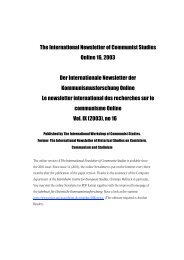The International Newsletter of Communist Studies Online
The International Newsletter of Communist Studies Online
The International Newsletter of Communist Studies Online
Sie wollen auch ein ePaper? Erhöhen Sie die Reichweite Ihrer Titel.
YUMPU macht aus Druck-PDFs automatisch weboptimierte ePaper, die Google liebt.
54<br />
<strong>The</strong> <strong>International</strong> <strong>Newsletter</strong> <strong>of</strong> <strong>Communist</strong> <strong>Studies</strong> <strong>Online</strong><br />
Sobhanlal Datta Gupta, New Dehli:<br />
Comintern and the destiny <strong>of</strong> communism in India. 1919 – 1943. Dialectics<br />
<strong>of</strong> real and a possible History, Calcutta, Seribaan, 2006.<br />
<strong>The</strong> opening up <strong>of</strong> the Comintern archives in Moscow in the 90s has now made it possible for<br />
the scholars to have the first glimpse <strong>of</strong> how the destiny <strong>of</strong> the <strong>Communist</strong> Parties <strong>of</strong>’ the<br />
world in the inter- War period was defined by politics inside the Comintern which, in turn,<br />
was predominantly shaped by the struggle for power inside the Soviet <strong>Communist</strong> Party after<br />
Lenin’s death. With the accessibility <strong>of</strong> the Comintern archives a massive literature has<br />
emerged in the West (primarily in Russian and German, besides English), leading to a<br />
reinterpretation <strong>of</strong> the understanding <strong>of</strong> Comintern as a historiographical problem in the light<br />
<strong>of</strong> these new sources. <strong>The</strong> book, based on these materials (archival and non-archival),<br />
provides for the first time an entirely new analysis <strong>of</strong> Comintern’s impact on the shaping <strong>of</strong><br />
Indian communism and argues about the alternative possibilities <strong>of</strong> the Left and communist<br />
movement in India in the light <strong>of</strong> documents which were suppressed or unknown till now. This<br />
reinterpretation <strong>of</strong> the role <strong>of</strong> Comintern (1919-1943), which masterminded the beginning and<br />
shaping <strong>of</strong> communism in India, will contribute to a refreshingly new understanding <strong>of</strong> the<br />
problems, complexities and crisis that communism in India has encountered in its long<br />
history. Besides the Comintern archives, the book is based on materials from the archives <strong>of</strong><br />
the <strong>Communist</strong> Party <strong>of</strong> Great Britain (CPGB), which include the papers <strong>of</strong> Rajani Palme Dutt,<br />
Harry Pollitt, Ben Bradley, the stenographic records <strong>of</strong> the Central Committee, Politbureau<br />
and the Party Congresses <strong>of</strong> the CPGB, all relating to the links between the CPGB, India and<br />
Comintern, papers from the Public Records Office, UK and the Private Papers <strong>of</strong> Horst Krueger<br />
in Berlin. <strong>The</strong> book has the following chapters: Chapter I: Comintern : the new historiography.<br />
Chapter II: <strong>The</strong> colonial question and India in the Lenin era: 1919-1923. Chapter III : India and<br />
the East in the period <strong>of</strong>’ „Bolshevization“ and „Third Period“: 1924-1934. Chapter IV : <strong>The</strong><br />
Indian question in the era <strong>of</strong> United Front and War: 1935-1943. Chapter V: Comintern and the<br />
Indian revolutionaries in Russia. Chapter VI: Indian communism: Dialectics <strong>of</strong> real and a<br />
possible history.<br />
See: http://www.sreejoni.com/bb.htm. Contact with the author: sobhanlal@dataone.in.<br />
Stalin: Revolutionary in an Era <strong>of</strong> War,<br />
by Kevin McDermott, Palgrave MacMillan, January 2006, 240 Pages. Part <strong>of</strong><br />
the European History in Perspective series.<br />
Stalin’s massive impact on Soviet history is <strong>of</strong>ten explained in terms <strong>of</strong> his inherent evil,<br />
personality defects and power lust. This volume argues that Stalin’s thoughts and actions are<br />
best contextualized in the inter-relationship between war and revolution in the first half <strong>of</strong> the<br />
twentieth century. Kevin McDermott incorporates recently declassified materials from the<br />
former Soviet Party archives and provides a critical review <strong>of</strong> western and Russian<br />
historiography. In his introduction, the author writes: This notion <strong>of</strong> ‘several Stalins’ is a useful<br />
corrective against oversimplification and cosy monocausal explanations <strong>of</strong> his actions and<br />
attitudes. It helps us appreciate the dynamic nature <strong>of</strong> his power from primus inter pares in,














